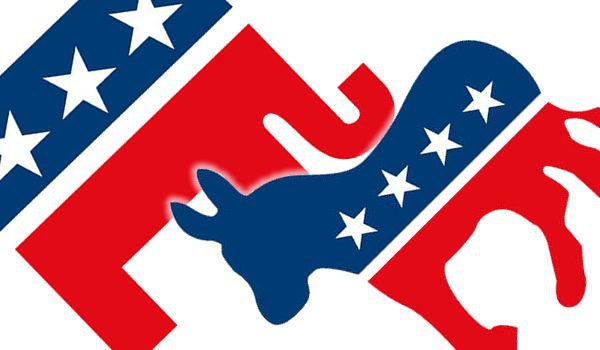The political left has argued with the right about many subjects over the last forty years, as the right has developed its political capital and tried to dismantle the New Deal. But one topic that the left has surprisingly not challenged head on very frequently is the right’s (and libertarians’) use and understanding of the liberty concept. This is surprising given that liberty is arguably one of the most important political concepts used by the right and, of course, one of the most potent symbols of being both American, and modern.
The Right’s Portrayal of Liberty
For the right, liberty is the master concept and symbol, if you will, that summarizes and justifies most of their core political positions. Liberty, as the right has defined it, refers principally to the protection of individual liberties and property. Because of our natural (and, for some, God-given) right to liberty, no one has a right to take my property or to meddle in my life. “Hands off what is mine,” is the cry. “Everything that is the product of my labor and work is mine alone. Do not touch it.” Tied to and justified by this understanding of liberty are other core convictions: that government should be small, that taxes should be minimal, that we should not redistribute wealth, that markets should be unregulated, that everyone who tries can make it, and that businesses should be allowed to operate relatively freely.
Some on the right, though not all, also evoke liberty to justify various moral positions, such as the defense of traditional marriage, the right to pledge to the flag, the right to bear arms, the desire for prohibition on abortion, and so forth. The concept of liberty, many of them argue, is core to what it means to be American. Liberty was embodied by Jefferson in the Declaration of Independence and by the founders in the US Constitution and the Bill of Rights. By protecting liberty, those on the right argue, we return to the core and founding principles of this country. By doing so, we are supposedly restoring the “lost constitution”[1] and recovering Jefferson and Madison’s true political philosophy. By embracing and defending liberty, they are the true Americans and according to some of them the ones who are fulfilling God’s will. And, by the way, their defense of liberty is also in line with the best of thinking in economics (Hayek, Mises, Friedman). Or so they say.
The “Liberty-First” Platform
Though not all of these positions are consistent with each other, and while not everyone on the right holds all of these views, they all come together to form what I have been calling a “liberty-first” platform and stream of thought that has united people who otherwise hold diverse assumptions. For those with historical interests, this positioning of liberty as the master concept for the right is present throughout the rise of the what Robert Horwitz has called “anti-establishment conservatism” and Paul Krugman calls “movement conservatism.”[2] The emphasis on such themes is already evident in Barry Goldwater’s campaign in the sixties and was taken up and developed more fully by President Reagan, reinforced by economist Milton Friedman, who himself inherited and developed ideas similar to and influenced by Hayek and Mises, and has become standard positioning among neoconservatives, right wing think tanks (e.g., FreedomWorks, Cato Institute, etc.), conservative philosophers (e.g., Richard Epstein), pundits (e.g., Sean Hannity, Rush Limbaugh), and a number of conservative supreme court justices (Scalia, Alito, and Thomas).[3] As Robert Horwitz aptly summarizes this, the distinctiveness of “American conservatism, born of classical liberalism’s focus on the individual, has usually gravitated towards theories of freedom and property. In this outlook, liberty and property are inescapably linked. Property makes it possible for a human being to develop in mind and spirit, that is, for an individual to be free. Property, thus, is a sacred moral value, the key to individual freedom and the prerequisite of a free society… Freedom can thus only consist in the ability of each person to develop without hindrance to the law of his or her own personality. Hence of fundamental concern to conservatism is the power of the centralized state and its threat to liberty and property.”[4]
Time To Take Back Liberty
Oddly enough, those on the left have not recently taken up and challenged this story about liberty, though they should.[5] Why has the left ignored it? Perhaps it was because the right had turned “liberal” into a bad word, though the right was ironically celebrating liberty at the same time. Or perhaps it was because the defense of liberty seemed too patriotic or nationalistic in tone for tastes on the left. Or maybe it was because the left had earlier roots in socialism and had not yet completely reconfigured itself and found its foundations in a new political philosophy that could spring more comfortably from the liberty concept. Whatever the reasons, the left has focused more on themes such as justice, equality, and fairness, by which to contest the right’s political positions and agenda.
There is nothing wrong in emphasizing those themes and much that is correct. But in ceding liberty to the right, and not fighting to own it, the left has made a mistake that should and can now corrected. For liberty is one of the core symbols of what America stands for and if the left has no or little interpretation of it, then it has relinquished a hold over a potent symbol of American identity. In its relinquishment of liberty to the right, the left grants to its opposition the appearance of having the one and only true interpretation of Jefferson and the Declaration, and Madison, the Constitution and the Bill of Rights, not to mention one of if not the most important and distinguishing moral idea of modernity in the West. The left without a compelling interpretation of liberty is like a Christian group without an interpretation of the New Testament. It is time to take back the concept of liberty and bring out the ways in which liberty in society has always implied responsibility and sacrifice as part of living together and as human beings who share a planet together.
1. See Napolitano, Andrew P. The Constitution in Exile: How the Federal Government Has Seized Power by Rewriting the Supreme Law of the Land. Nashville: Nelson, 2006 and Barnett, Randy E., Restoring the Lost Constitution: The Presumption of Liberty. Princeton: Princeton University Press, 2004.
2.Robert B. Horwitz, America’s Right: Anti-Establishment Conservatism from Goldwater to the Tea Party. Cambridge: Polity Press, 2013, Loc 159, and Paul Krugman, The Conscience of a Liberal. New York: W.W. Norton & Company, 104-105.
3. On the use of freedom as a theme in Goldwater’s campaign, and in Goldwater’s Conscience of a Conservative, for example, see Rick Pearlstein, Barry Goldwater and the Unmaking of the American Consensus. New York: Nation Books, 2001, 83-84.
4. Horwitz, America’s Right, Loc. 153;
5. Arguably FDR offered an expansive liberal theory of freedom as part of his New Deal, which was articulated in his “Four Freedoms” speech which he gave in 1941 in the State of the Union. In it, he declared freedom to include “freedom from want” and “freedom from fear.” In attempting to dismantle the New Deal since the 1960’s, conservatives have been fundamentally attacking the New Deal institutions and articulating a fundamentally different notion of liberty. For a historical discussion of FDR, see Eric Alterman and Kevin Watson, The Cause: the Fight for American Liberalism From Franklin Roosevelt to Barack Obama. New York: Penguin, 2012, 7. For a thoughtful discussion of FDR’s position, see Cass Sunstein, The Second Bill of Rights: FDR’s Unfinished Revolution and Why We Need It More Than Ever. New York: Basic, 2004.




